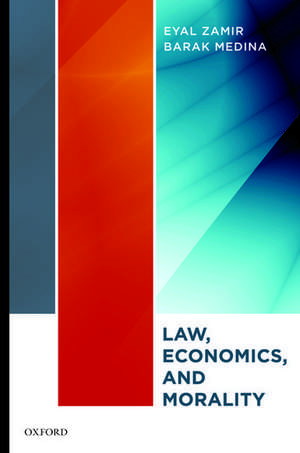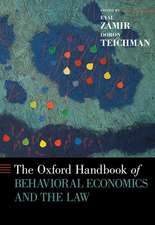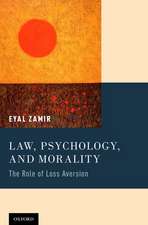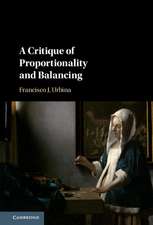Law, Economics, and Morality
Autor Eyal Zamir, Barak Medinaen Limba Engleză Hardback – 8 apr 2010
Preț: 703.98 lei
Preț vechi: 1008.89 lei
-30% Nou
Puncte Express: 1056
Preț estimativ în valută:
134.74€ • 140.14$ • 112.91£
134.74€ • 140.14$ • 112.91£
Carte tipărită la comandă
Livrare economică 03-08 martie
Preluare comenzi: 021 569.72.76
Specificații
ISBN-13: 9780195372168
ISBN-10: 0195372166
Pagini: 376
Dimensiuni: 234 x 156 x 22 mm
Greutate: 0.7 kg
Ediția:New.
Editura: Oxford University Press
Colecția OUP USA
Locul publicării:New York, United States
ISBN-10: 0195372166
Pagini: 376
Dimensiuni: 234 x 156 x 22 mm
Greutate: 0.7 kg
Ediția:New.
Editura: Oxford University Press
Colecția OUP USA
Locul publicării:New York, United States
Notă biografică
Eyal Zamir holds an LL.B. (1982) and Dr.Jur. (1989) from the Hebrew University of Jerusalem. He is an Augusto Levi Professor of Commercial Law at the Hebrew University, where he served as Dean of the Faculty of Law from 2002 to 2005. Professor Zamir was a visiting researcher at Harvard Law School (1990-1991), a visiting scholar at Yale Law School (1996-1997), a Senior Global Research Fellow at New York University School of Law (2005-2006), and a visiting professor at Georgetown University Law Center (2008, 2009). Professor Zamir's research interests include contract andcommercial law and theory; economic and behavioral analysis of law; law and normative ethics; and proprietary aspects of the Arab-Israeli conflict. He authored or edited ten books and published more than thirty articles in Israeli and American law reviews. Professor Zamir has been awarded numerous fellowships and prizes, including the Fulbright Researcher Award (1990-1991).Barak Medina is Lawrence D. Biele associate professor at the Hebrew University of Jerusalem, and currently serves as the Dean of the Faculty of Law. He holds an LL.B. (1991) from Tel-Aviv University and LL.M. (1996) from Harvard Law School; he also holds a B.A. (1990) and M.A. (1992) in economics from Tel-Aviv University and Ph.D. in economics (1999) from the Hebrew University of Jerusalem. Professor Medina was a visiting professor at Columbia Law School (2006-2007). He served as Co-Editor of the Israel Law Review from 2003 to 2007. He also served as an adviser to the Constitution and Legal Affairs Committee, the Knesset (Israeli Parliament), on drafting a new Constitution for Israel, 2004-2005. Professor Medina's research interests include constitutional law and intolerant democracy, administrative law, economic analysis of law, and game theory and the law.






















